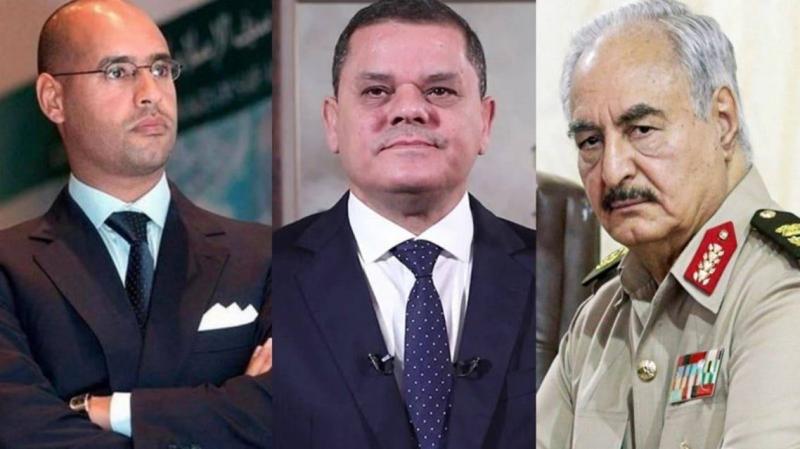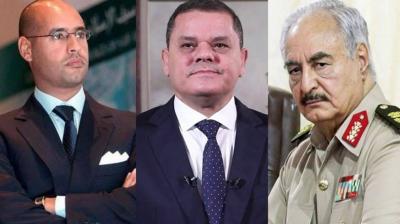Candidates for the Libyan parliamentary and presidential elections begin registering today, Monday, for a two-week period, in what will be the country's first "presidential" vote. Everyone hopes this election will end the chaos and division that followed the fall of Muammar Gaddafi's regime in 2011. These elections are expected to feature a long list of candidates, particularly for the presidential election set for December 24, which many find appealing due to the significant powers granted to the incoming president under Libyan law.
So far, several political figures have announced their intention to run for the presidency, including former Libyan representative to the UN, Ambassador Ibrahim Dabbashi, the chairman of the Revival of Libya bloc and former ambassador to the UAE, Aref Nayed, as well as parliament member Abdel Salam Nasiya and the head of the Renewal Party, Suleiman Bayoudhi. There are also a comedian and others not widely known to the public, while so far, there has been no significant interest from women in the position.
**Haftar and a Strong Contender**
There are strong expectations in Libya for both Army Commander Khalifa Haftar and Parliament Speaker Aguila Saleh to run. Several sources have indicated that Saleh is under pressure to withdraw his candidacy to allow space for Haftar, aiming to avoid splitting the votes from the eastern region. However, Saleh's supporters argue that the military commander is not the preferred choice for the western region and may not be the "winning horse" for the Fezzan region, especially after the High State Council threatened war if Haftar were to gain power.
Additionally, former Interior Minister of the GNA, Fathi Bashagha, is expected to run, relying on votes from the western region, particularly his hometown of Misrata. However, if incumbent Prime Minister Abdul Hamid Dbeibah, who enjoys greater popularity in the region and has managed to challenge the legal barrier preventing him from running—Article 12, which requires candidates to cease work three months before elections—succeeds, he could threaten Bashagha's chances of returning to power.
**Saif al-Islam Gaddafi**
Furthermore, Saif al-Islam, the son of the late leader Muammar Gaddafi, is considered a potential candidate by supporters of the former regime, especially after he announced during an interview with The New York Times his imminent return to Libyan politics.
In this context, political analyst Mohammed Al-Raesh downplayed the chances of both Ibrahim Dabbashi and Aref Nayed due to their presence outside the country and their weak popularity and political influence within Libya, as well as the lack of sufficient supporting factions and tribes, despite the media network managed by Nayed working tirelessly to promote him. The same applies to Fathi Bashagha, whose chances he believes are slim due to his declining popularity following his failure to lead the government formed from the Political Dialogue Forum, which was won by Dbeibah, and his opposition to strong armed groups in Tripoli.
**Only Three Names**
If elections proceed and predictions about the candidate names hold true, Al-Raesh predicts in a statement to "Al-Arabiya.net" that the race for the presidency will likely be limited to three names: Abdul Hamid Dbeibah, who has gained considerable popularity since taking office, having leveraged his position to rally people through programs and initiatives benefiting everyone, positioning him as the "ideal candidate" favored by the Tripoli region, and potentially some southern cities as well.
According to this speaker, Dbeibah will compete with Saif al-Islam Gaddafi, who has significant electoral support from the former regime's backers, benefiting from a segment of the Libyan street disillusioned by the lack of stability and division in the country. Meanwhile, votes opposing Gaddafi’s son and Dbeibah will likely go to Army Commander Khalifa Haftar, who is expected to garner most of the eastern region's votes for regional and political reasons, along with some votes from the south, unless Parliament Speaker Aguila Saleh runs.
It is worth noting that with about a month and a half before the elections, Libya is experiencing heightened tensions amid disagreements among the main political factions regarding election laws, candidacy requirements, and the election date, alongside calls to postpone the elections until a constitutional referendum is conducted, as well as calls to boycott.




